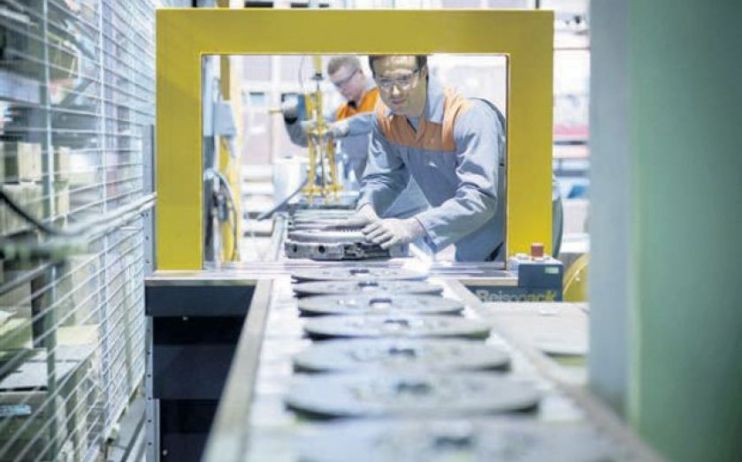UK manufacturing sector records worst month in six years

UK manufacturing fell to its lowest level of output since February 2013 last month, according to a closely followed measure of industry activity.
The sector’s downturn deepened in June as it fell to a 76-month low of a score of 48 on IHS Markit’s purchasing managers’ index (PMI) measure, released today.
Read more: Eurozone manufacturing falls to three-month low as Germany suffers
Experts blamed the drop on the aftershocks of heavy Brexit stockpiling before the UK’s original departure deadline of 29 March.
Since then, an extended deadline of 31 October averted the threat of a no-deal Brexit, but left companies with swollen stock cupboards.
Consequently demand dropped, with new business orders falling to a seven-year low.
High stock levels, ongoing Brexit uncertainty, a wider economic slowdown and tougher competition all played a part in a sinking number of new orders, IHS Markit said.
Manufacturing output shrank at its fastest level since October 2012, marking the UK sector’s third consecutive month of decline.
Rob Dobson, director at IHS Markit, said: “The downturn in UK manufacturing deepened during June, as the impact of firms unwinding stockpiles built before the original Brexit date continued to reverberate through the sector and exacerbate weak demand.
“There will need to be a substantial improvement in economic conditions at home and overseas, alongside reductions in both Brexit and domestic political uncertainties, if manufacturing is to see a sustained revival in the coming quarters.”
Domestic and foreign market demand weakened last month, while new export orders fell for the third month in a row.
Glass half empty
Business optimism also tumbled, falling to its third-lowest level since IHS Markit’s records began.
Still, while 14 per cent of manufacturing firms predict another shrink in 12 months’ time, 44 per cent believe industry output will improve.
The optimists pointed to hopes of a recovery in the car industry, new products launching and higher exports and growth.
But companies shed jobs to make up for the reduced work, with hiring freezes also playing a part as staffing fell.
Downturn deepens
Duncan Brock, group director at the Chartered Institute of Procurement & Supply, blamed a “triple whammy” of the fallout from the Brexit delay, weaker demand and low optimism.
“The sector was left gasping for breath,” he added.
“The sector’s strength is slowly slipping away, deprived of the oxygen of a reduction in Brexit uncertainty and an associated return of confidence to the marketplace. All the signs from the manufacturing sector point to another decline next month unless someone pulls a rabbit out of the Brexit hat.”
UK remains attractive in the long term
Steve Harris, head of manufacturing for large corporates at Lloyds Bank Commercial Banking, said the sector is struggling to see its true state of health due to stockpiling.
“Stockpiling has been the key trend in the industry for the past year, making it difficult to get an accurate reading on ‘true’ activity in the sector, and continuing to put pressure on working capital and supply chains,” he said.
Read more: Brexit uncertainty and rising costs to bite second quarter growth
“Against this background it can be hard for manufacturers to remain upbeat. Nevertheless, the UK does remain an attractive place to invest in the longer term.”
He added: “A strong majority of UK manufacturers would like to avoid a no-deal Brexit and would prefer the UK’s exit from the EU to be as smooth and clear as possible. Beyond the EU borders, economies that have previously been reliable export markets have softened as a result of slower domestic growth and increasing geopolitical tensions.”